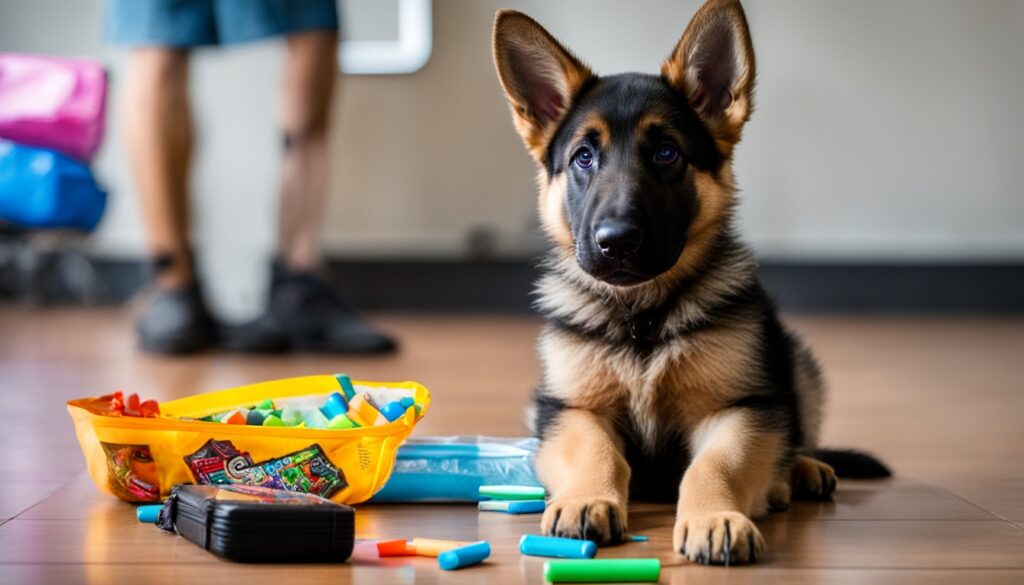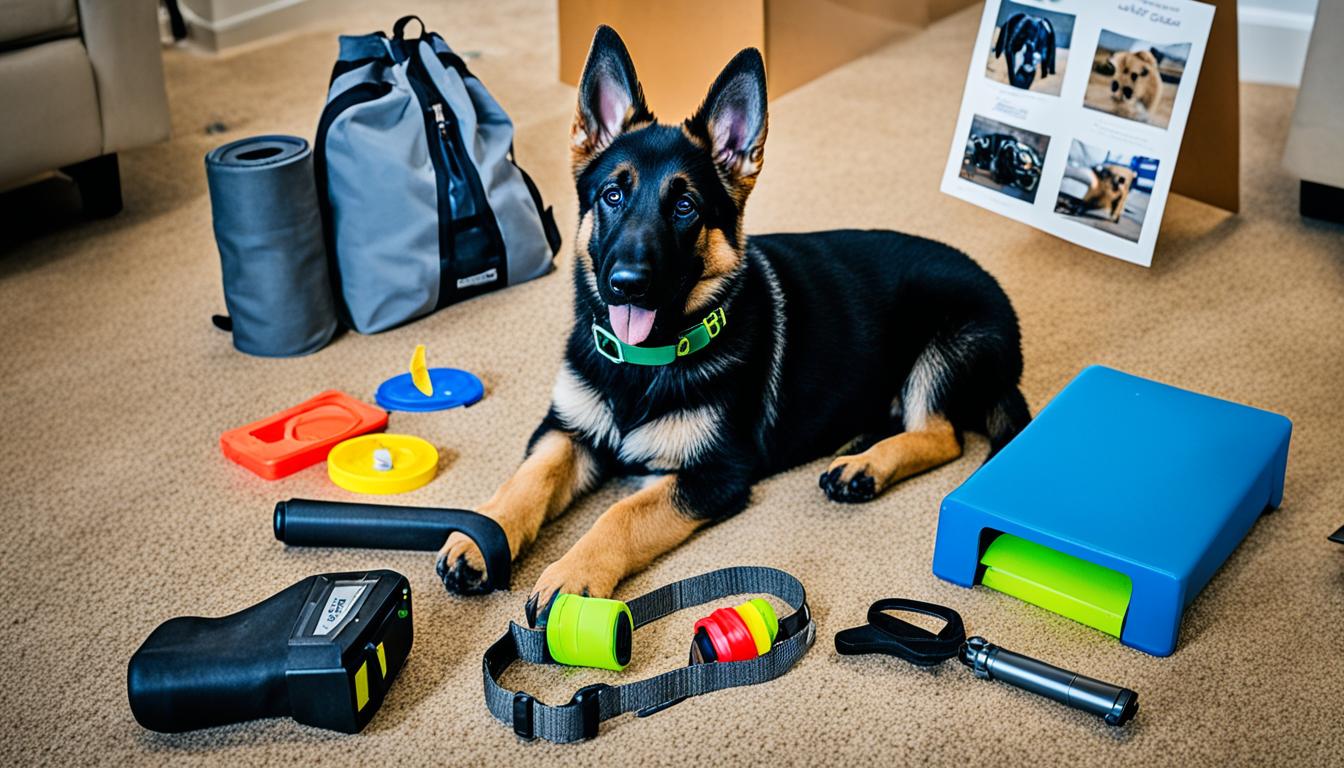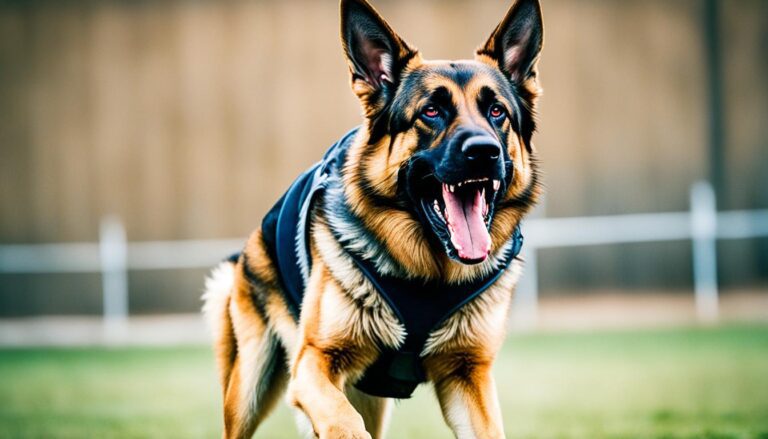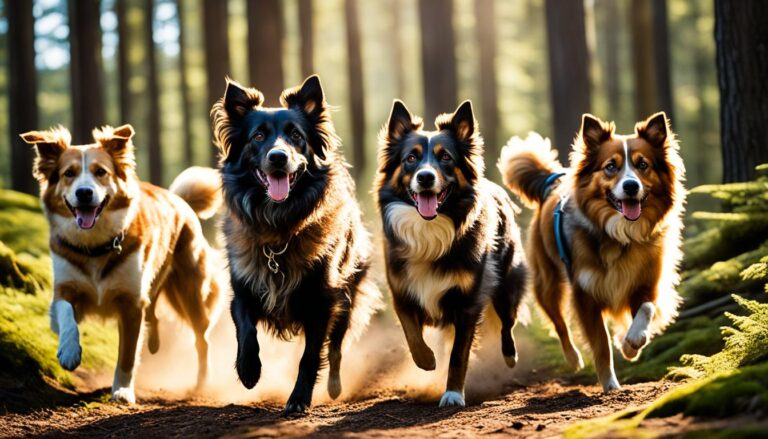German Shepherd puppy training schedule – Creating a training schedule.
A well-trained German Shepherd Dog (GSD) brings joy and is the USA’s second favorite animal. It all begins with puppy training, helping your GSD learn early. Picking a trustworthy breeder is key in this process. Good breeders match a puppy’s traits with your family’s needs. Well-bred GSDs are smart and love to make their owners happy. Yet, they need consistent training from a young age due to their intelligence and desire to work. This guide offers a German Shepherd puppy training schedule. It includes essential obedience, socialization, and behavior training for your pup.
Key Takeaways
- Finding a reputable breeder is crucial for starting your German Shepherd puppy off on the right foot.
- Consistent and ongoing training from an early age is essential for harnessing the intelligence and trainability of the GSD breed.
- Socialization during the critical window of 8-16 weeks helps build confidence in your GSD puppy.
- Obedience training and impulse control are important focuses from 3-9 months of age.
- Continuing training and providing outlets for the GSD’s versatility is crucial beyond the puppy stage.
Introducing Your German Shepherd Puppy to Training
Finding the Right Puppy
Finding the right German Shepherd puppy starts with a good, ethical breeder. They observe puppies closely to match them with the right home. If adoption is your choice, the AKC Rescue Network has over 40 GSD rescues. When discussing options, make sure to talk about your family’s needs. This will help you find a puppy that fits your lifestyle.
The Importance of Early Socialization
Early socialization is key for all puppies, with a critical window that closes by 16 weeks. For GSDs, this is crucial since they are natural protectors. Proper socialization teaches them to tell friendly faces from potential threats. By introducing your puppy to a variety of people early, it will boost their confidence. They’ll learn to be at ease with strangers rather than reacting with fear or aggression.
Establishing Routines and Crate Training
Crate training is a great practice for the German Shepherd breed. It eases them into solitude and can prevent separation anxiety. Housetraining is also aided by crate use, which GSDs are quick to pick up. With attentive supervision and regularity, housetraining a GSD can be notably straightforward.

German Shepherd Puppy Training Schedule – Creating a Training Schedule
From 8 to 16 weeks, focus on German Shepherd puppy training for socialization and housetraining. Socialization is vital for the GSD puppy. It teaches them how to act around new things. It also builds their confidence. At this age, crate training is beneficial. It helps with both socializing and housetraining. Most GSDs pick up housetraining quickly when crate training is part of their routine.
3 to 9 Months: Obedience Training and Impulse Control
Between 3 to 9 months, shift to training goals like obedience and impulse control. The German Shepherd’s strong work ethic shines through with reliable obedience training. Start with fundamental commands such as sit, down, and stay, including leash manners. Encourage them to sit before any fun activities or meals. This teaches them patience and control. It’s crucial for preventing boredom-induced misbehavior in GSDs.
Continuing Training Beyond Puppyhood
When do we stop calling a German Shepherd Dog (GSD) a puppy? Generally, this happens around their first birthday. But, a GSD may not fully mature until two or three years old. Male GSDs typically mature later than females. Thus, training should carry on.
During this time, focus on impulse control and better obedience. Start activities like tracking, scent work, and protection training. These are all things a GSD excels at. Another option is agility and herding. This ongoing training will help your GSD develop vital skills.
Training should be a part of your routine until your GSD becomes an adult. At this adult stage, skills should be finely tuned. It’s also the right moment to shift to feeding them with large breed dog food. GSDs do best when they have work to do. If you keep them engaged and challenged, they will be joyful.
Milestones in training vary from dog to dog. The secret to success is steady, positive, and personalized training. Understand your GSD’s needs and what motivates them. With your commitment and patience, your GSD can become an exceptional companion. They will be loyal, smart, and well-behaved.
FAQ
What are the most important factors to consider when finding a German Shepherd puppy?
Why is early socialization critical for German Shepherd puppies?
What are the primary training goals for a German Shepherd puppy from 8 to 16 weeks?
What should the focus be for German Shepherd puppy training from 3 to 9 months?
How long does it take for a German Shepherd to reach full maturity?
Source Links
- https://www.akc.org/expert-advice/dog-breeds/puppy-training-timeline-for-your-german-shepherd-dog/
- https://zigzag.dog/blog/puppy-training/breed-specific/guide-how-to-train-german-shepherd-puppy/
- https://www.germanshepherds.com/threads/daily-schedule-of-a-gsd.749345/
- https://andreaarden.com/dog-training/how-to-train-german-shepherd/
- https://www.akc.org/expert-advice/training/puppy-training-timeline-teaching-good-behavior-before-its-too-late/
- https://boltdogtraining.com/age-to-start-puppy-training/
- https://dogs4motionacademy.com/fundamentals-for-puppies/







